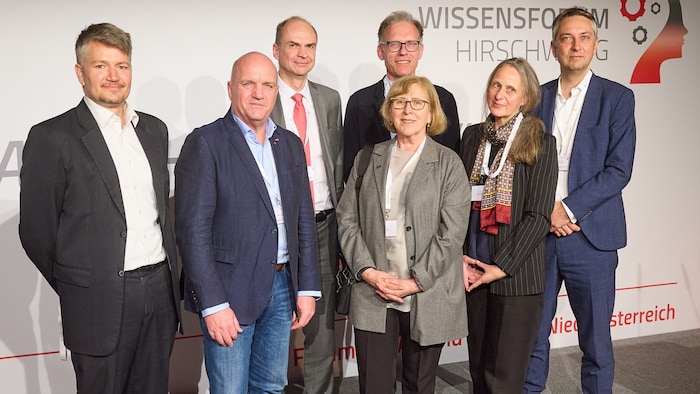Challenging times
What the future of work looks like in Austria
Experts discussed the future of work at the "Knowledge Forum Hirschwang" in Hirschwang on Wednesday. AKNÖ President Markus Wieser emphasized the importance of the topics of change in the world of work, fair distribution and security of supply, summarized as the "3V for Austria's future". Hubert Gambs from the EU Commission spoke about the need to make the EU competitive and sustainable.
Not a day goes by without these 3Vs being discussed, AKNÖ President Markus Wieser was pleased to say in his speech to the more than 100 participants in attendance. As a continuation of this work on the "3Vs", science, research, industry, interest groups, students and specialists of the future have gathered here in Hirschwang for the first Knowledge Forum. Supported by the European Economic and Social Committee and the European Commission, among others.
Changes only possible in cooperation with employees
Hubert Gambs, Deputy Director General and SME Coordinator of the Directorate-General for the International Market, Industry, Entrepreneurship and SMEs at the European Commission, emphasized the importance of workers and employees helping to shape the process in his speech. "Structural efforts can only be achieved in cooperation with employees," said Gambs, who highlighted the Austrian social partnership as exemplary for the whole of Europe.
At EU level, Gambs referred to the following points: The European "Green Deal" aims to make Europe climate-neutral and competitive. At the same time, the EU has also concluded agreements with other countries for rules-based open trade in the world. In the event that supply chains are disrupted, the EU is promoting the development of chip factories in Europe, for example. Networks of clusters and industrial alliances of companies are also being promoted. For example, the Styrian-Carinthian "Greentech Valley".
High-quality jobs for satisfied employees are the prerequisite for the economic success of the EU. "Ultimately, however, it is the EU member states that are decisive, it is about the social network in our society," concluded Gambs.
The challenges of the future
The topics discussed at the forum included the changing world of work and the challenges of the future, including the need to promote adaptation and reorientation in working life. The difficulties in finding qualified employees in certain areas were also addressed. Another focus was the role of the EU in promoting competitiveness and climate neutrality. It was emphasized that quality jobs are essential for economic success, with EU member states playing a key role.
Finally, the challenges for Generation Z were highlighted. The young generation is confronted with a complex working world in which flexibility and adaptability are required. The study by youth researcher Barbara Großegger was presented, which highlights the needs and expectations of young employees.
They are optimistic about their personal future and pessimistic about the future of society. At the same time, only one percent of today's young people say they live a carefree life. This extremely contradictory attitude is due to the fact that these young people were socialized in years of permanent crisis, from Covid to the Ukraine war to the unresolved ongoing construction site of climate change. So the challenge for today's youth is to find their way in a highly complex post-growth society.

There is great uncertainty with regard to artificial intelligence: just under a third of the apprentices surveyed expect AI to take all their work away or leave only the tedious and boring tasks. Only one sixth of apprentices hope that artificial intelligence will bring improvements.
Adaptability as a strength of Generation Z
This high degree of contradiction is also reflected in what Generation Z expects from their environment and the world of work: on the one hand, they have a great need for security and value continuity and stability more than was the case for a long time. At the same time, they are less willing to commit to their current job. Generation Z changes jobs more frequently than older employees and sees adaptability as a strength: "Young people are open to options that they didn't originally consider. But we have to offer these options," says youth researcher Großegger.













Kommentare
Willkommen in unserer Community! Eingehende Beiträge werden geprüft und anschließend veröffentlicht. Bitte achten Sie auf Einhaltung unserer Netiquette und AGB. Für ausführliche Diskussionen steht Ihnen ebenso das krone.at-Forum zur Verfügung. Hier können Sie das Community-Team via unserer Melde- und Abhilfestelle kontaktieren.
User-Beiträge geben nicht notwendigerweise die Meinung des Betreibers/der Redaktion bzw. von Krone Multimedia (KMM) wieder. In diesem Sinne distanziert sich die Redaktion/der Betreiber von den Inhalten in diesem Diskussionsforum. KMM behält sich insbesondere vor, gegen geltendes Recht verstoßende, den guten Sitten oder der Netiquette widersprechende bzw. dem Ansehen von KMM zuwiderlaufende Beiträge zu löschen, diesbezüglichen Schadenersatz gegenüber dem betreffenden User geltend zu machen, die Nutzer-Daten zu Zwecken der Rechtsverfolgung zu verwenden und strafrechtlich relevante Beiträge zur Anzeige zu bringen (siehe auch AGB). Hier können Sie das Community-Team via unserer Melde- und Abhilfestelle kontaktieren.